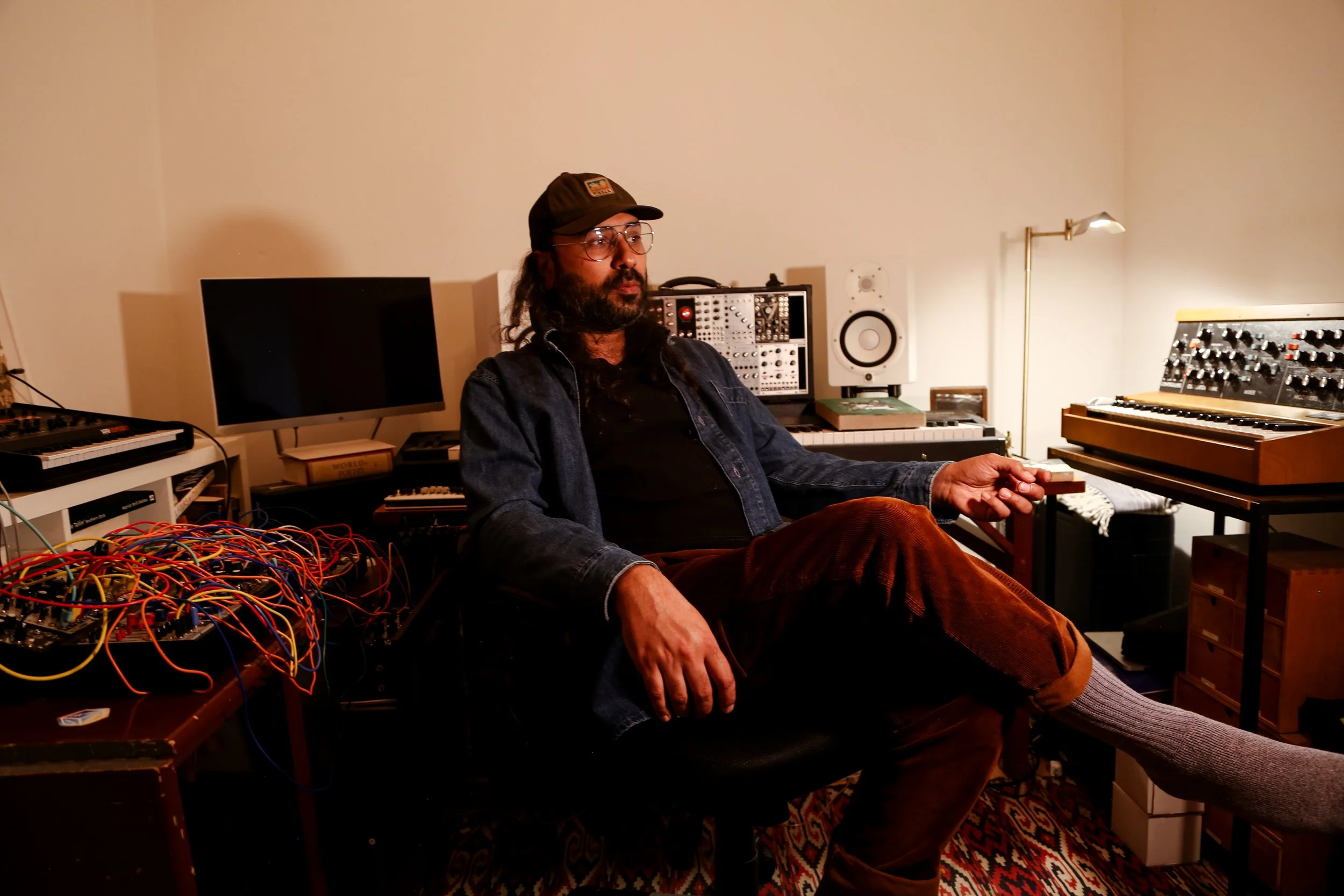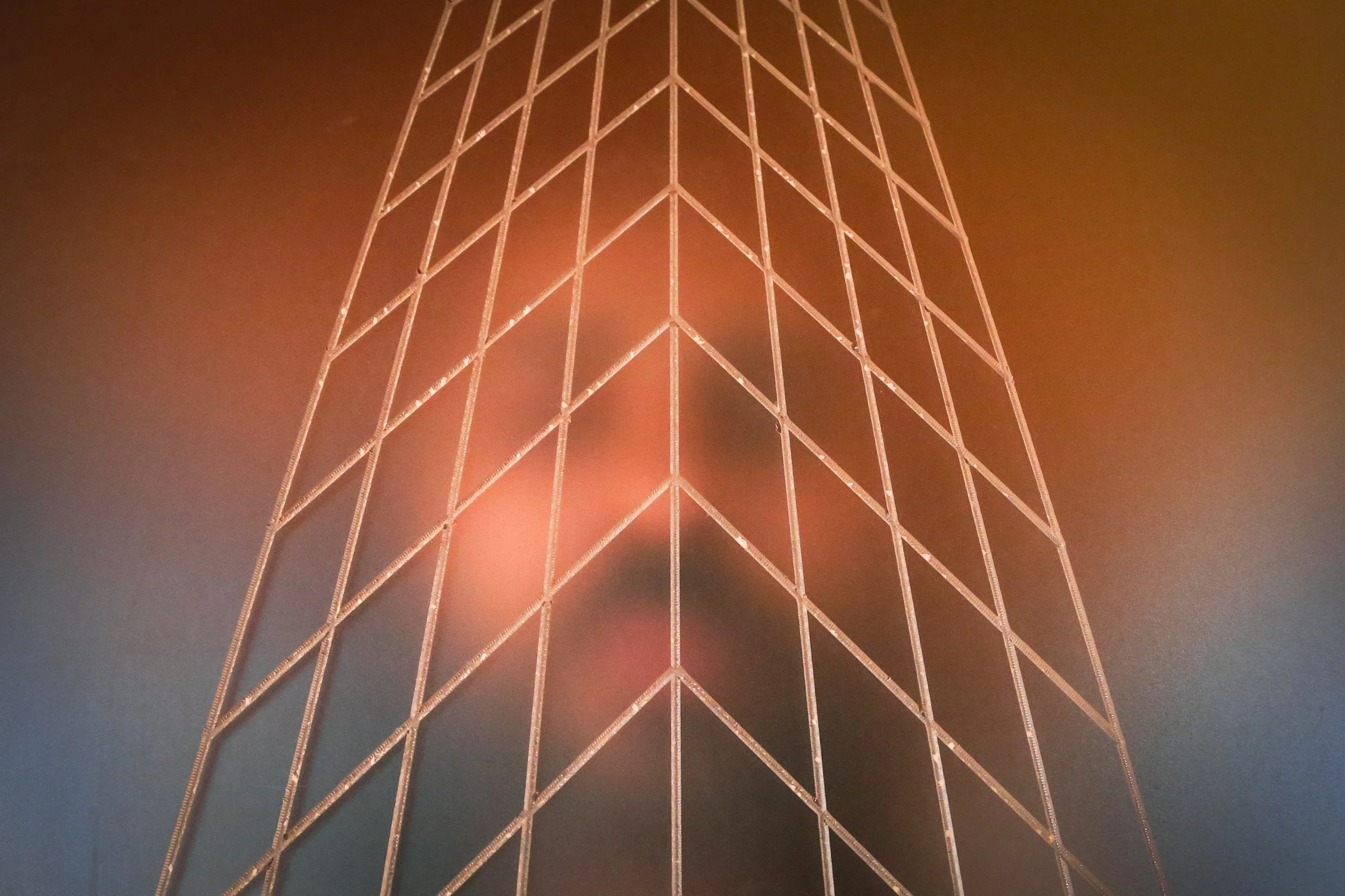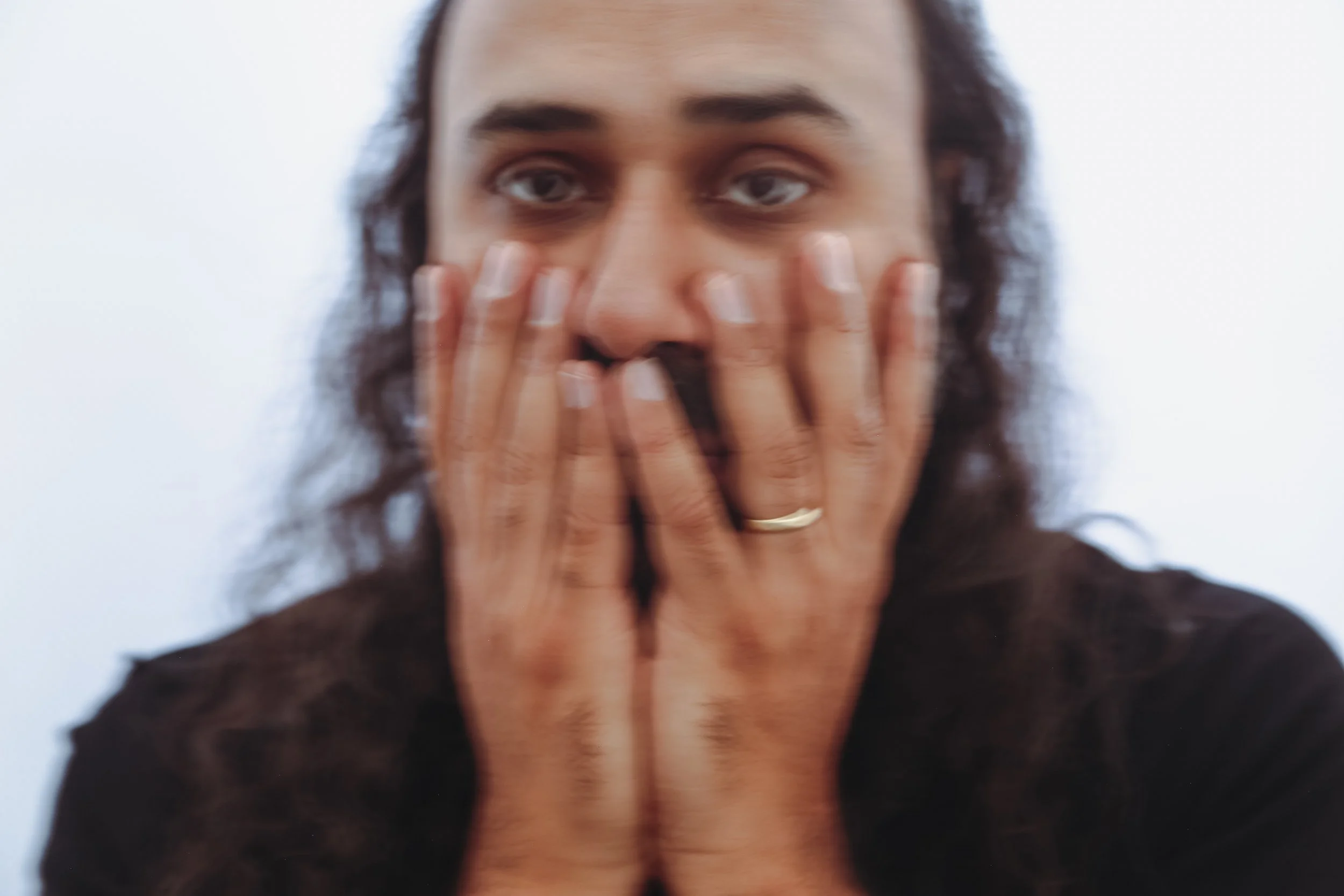5 Questions with Qasim Naqvi
In a city built on contradiction and collision, composer and artist Qasim Naqvi finds inspiration in the liminal space between chaos and order, between the analog breath of the organic and the cold, deliberate pulse of the engineered. He’s a restless architect of sound, as equally at home summoning the wild flux of modular synths as he is constructing crystalline scores for film and ensemble.
Having grown up in New York at its most febrile, where wealth and poverty, serenity and frantic disorder brushed shoulders in every borough. For him, storytelling is a framework for emotional reckoning, and his music is a response to the world’s troubled present: wars raging, ideologies fracturing, truths complicated by circumstance. Determined to spark catharsis, Naqvi creates full-body listening experiences intended to transport audiences through multiple landscapes. In conversation, as in his compositions, he moves with honesty and intent, ever searching for meaning, not just in the art itself but in bearing witness to what’s around him.
Your new record feels like it lives between the organic and the engineered. How conscious are you of that when you're composing, and does it reflect something deeper about how you see the world?
I think I've felt most alive dealing with creative extremes, like balancing the organic and the engineered or the illegible and the legible. I think it comes from my love for experimental improv. and composed music. For me, one world is purely spontaneous, like a magically unrepeatable abstraction. And the other is more crystalline and deliberate, like a slowed-down blueprint of my thinking. I can look at it over and over again and refine and engineer. And for me, there’s a dynamic range between these extremes, and I’ve been trying to access as much within that range as possible through my creative life. I deeply appreciate the rough and imperfect aspects of music. There’s so much unquantifiable magic when ideas can move out of phase, from normalcy into something less obvious and distorted, and back. Growing up in a place like New York City for most of my life, I was exposed to a distortion of human experience. Maybe not as much now, but back in the 80s and 90s, it was kind of an insane place to be. Wealth, poverty, happiness, despair, order, anarchy- all holding hands in a push and pull circle. You’d see a rich person walking 5 Borzois and turn a corner and see a man in his underwear, pulling a cart filled with his life’s possessions, with equal ownership. It’s one of the few places where extremes coexisted in this really volatile way, where all manner of experience was intermeshed and less partitioned. I think my appreciation of dynamic expression came from that exposure as well, from the murkiness of human behaviour and a beauty in how it all moved within the perfect and the imperfect.
When I started getting more curious about modular synthesizers, something clicked for me. With the insanity and volatility of everything, here was this musical instrument that felt like an embodiment of all of that. A modular synthesizer is very adept at making things imperfect- a little adjustment within one area of the machine's behaviour can send this rippling effect throughout the system. It can wildly change the composure of the music while, at any moment, bringing it back into sharp focus. In this way, it’s been a great tool; it’s felt like an ensemble of improvisers that I'm conducting. On ‘Endling’, tracks like “Plastic Glacier” and “In the Distance” were created live with no multitracking, just a stereo left/right output from the modular’s performance. It gave me this music that was like a symphony of biomechanical instruments, and with all the knob turning, I was orchestrating how its energy flowed and to what musical effect. A lot of the music on ‘Ending’ was made with this machine, and as expressed, it feels like a supreme example of this range between the organic and the engineered or the improvised and the composed.
You've worked across so many different formats, from ensemble work to scoring for film. What part of yourself were you trying to surface or explore with Endlings specifically?
With ‘Endling’, the structure was like a concept album. It was the first time I created a fictional narrative and then composed a set of music around that. The tracks were like chapters based on these visions of an endling- the last of the human species, on a journey through a crumbling earth of the future, that was now swallowed up and reclaimed by nature. I created the track titles first and then kind of made this storyboard in my mind of what each piece would convey in this fantastical landscape. For example, “Plastic Glacier” is about an object the size of Mount Everest, created over centuries from the plastic in the oceans. In the world of ‘Endling’, it circles the earth like a monument or a ghost ship. Titles like these felt like miniatures within a larger landscape mural. And I could gaze at it in my mind for inspiration. Coming up with these narrative frames first really allowed the process to flow in a way, and the music helped write itself. It was like writing an odyssey of some kind, which was a new approach for me.
Do you think your sense of time and pacing is something you've trained, or something instinctual?
I believe that with anything you’re dedicated to, over the years, your gaze can widen, and you can draw things into your creative memory banks in a more instinctual way, and also hear the musical structure in things totally unrelated to music. And for me, the hope is that all the training and living can act as fuel for my instinctual centre, which I believe is the most honest representation of my creative self. Something I've noticed with age is that I question my choices a lot less, and there’s more of a basic on/off determination if something is working or not. I feel like this is just a result of time and practice, and feeling more comfortable with my actual self, not some other self that I wish I could be. That was definitely something I grappled with when I was younger, probably like a lot of artists. As far as my training, I think having a lot of varied creative experiences has helped. There’s definitely what i’ve learned as a drummer: being in a band like Dawn of Midi where we play very complex and precise polyrhythmic music, but also having a deep love for experimental improvised music, where there is this other highly reactionary sense of time and pacing, where your nervous system in on high alert in this beautiful way. Spending some good amount of time learning composition was also helpful.
I grew up watching films and visual media, and working in film was very profound as well. With film music, you’re creating this invisible emotional presence that radiates around the tone and the action of what you’re seeing. You’re supporting a whole array of elements that are created by teams of other people, and there’s a time and pacing that shows deference to that- a time and pacing to the collaborative spirit of working with others.
Then there’s the pacing of life: of how I engage with other humans on the level of language and understanding. There’s the music and rhythm of things in the chaos of the day-to-day, like being at Grand Central Station and hearing thousands of people talking at once, and it starts to sound like some giant static chord. Or hearing the sound of an escalator, which, from a distance, sounds like some insane clarinet study in just intonation. I guess it’s about being open to the sounds of a lot of things, in and out of music. And over time, filling the memory banks to the point where my process can feel largely intuitive.
What are you hoping the listener walks away with when they sit with your work in full?
With ‘Endling’, my hope is for the listener to go on a journey. To have an immersive experience where they can leave themselves behind and be transported. Making this album in 2024 was a way for me to deal with a lot of very troubling things of the time. The atrocities in Gaza- the indiscriminate killing and starvation of people on a mass scale, the growing ideological divide in the United States, and the sense of outrage, anguish and hopelessness that a lot of people were feeling around the world. It was a strong collective sentiment. As I was making this music, it would always bring me back to the moment and make me deal with and purify the harshness of the outer world through sound. The weird futuristic landscape of this record was like a window looking out into the present. With that said, I hope this music can provide a space for the listener to process and offload some of the challenges they may be dealing with in life, as well, to experience some catharsis.
Listening to a whole album and giving it all of your attention, I feel, can create a magical environment. I think your consciousness can change. You can stop thinking about yourself; the normal day-to-day patterns are broken if only for a moment, and a totally nourishing experience can unfold.
“I’ve felt most alive dealing with creative extremes, like balancing the organic and the engineered.”
Do you think music has a responsibility to say something about the world, or is it enough for it to just be? How do you navigate that line in your own practice?
This is an important question. A main pillar of my education was learning about the great Black American music of the 60s and ‘70s and the downtown experimental scene of New York. Art celebrated the volatility of the time, it brought to light the grief as well as the joy, and the astral. I learned a lot from that era- that, much like humans and our constant interaction with a plethora of emotional states, music was capable of the same. That it wasn't just entertainment. It could go as far as thought could reach. And for better or for worse, I’ve been trying to do the same with my art. I see beauty in the murkier depths of us, and I like taking some of that sludge and mixing it with the light. I like that marbling of expression that isn’t always trying to be the same feeling always. And as just a personal observation—especially with a lot of music in America now—I’ve felt an increasing shift: a safeness in sound, a desire for easily digestible music, music that’s like a peripheral and passive listening experience. I wonder if active listening and contemplative music ask too much of the listener. Maybe there’s something undesirable about that now, but it’s something that makes me feel the most alive, as an all-in experience.
I can only speak of my experiences as a Pakistani-American, where things currently feel somewhat hopeless. Where it feels like our rights are being stripped away, our natural environment is being destroyed, where my tax dollars are aiding a genocide in another part of the world, where people are being separated from their families and deported, and where people are losing both bodily and intellectual autonomy, among many other things.
What should art be saying in times like these? I suppose if all art were revolutionary, it would be exhausting. It would feel like a ban on the simple pleasures in life. I don’t want that. But I don’t know… I feel a growing avoidance of any sort of tension or revolution in music, and it feels like a way out from the truth, like blinders. As I get older, it seems harder to just make things that exist in a musical vacuum or that are just about me. So I guess yes, we would benefit from some more music which speaks of things that are larger than just the people who are making it. To shake people out of apathy and change things from within.
Follow Qasim Naqvi here.
‘Endling’ is out now on Erased Tapes.



